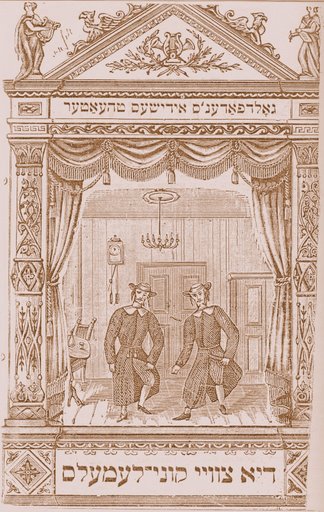1893?
Tsvey Kuni Lemel

Click Here for Slide Show
This entry is part of an online exhibit entitled: 'Abraham Goldfaden: A Centennial Tribute,' prepared by Eva Heinstein with help from the JMRC staff. To view the exhibit in its entirety click on the link above.
Goldfaden's play Tsvey Kuni Lemel (1880) represents the height of his maskilic (Jewish Enlightenment) comedic output. The storyline is based on a popular German comedy Nathan Schlemiel by J. Rosenzweig. The play follows the story of Carolina, a daughter of a wealthy Hasid, who falls in love with Max, a maskil medical student. Her father insists that she marry an observant Jew, and with the help of a self-interested matchmaker, finds Kuni Lemel (Max's cousin), a short-sighted, stuttering, limping boy of respected Rabbinical lineage. Max takes advantage of his physical resemblance and dresses up as Kuni Lemel to furl the match, and marry his beloved Carolina. In the end, Max wins Carolina, which Goldfaden portrays as a triumph of maskilic values over religious hegemony. The image above is the title page of the script, published by the Hebrew Publishing Company in New York (1893?). Source: Yiddish Drama Collection at the Jewish National and University Library.






